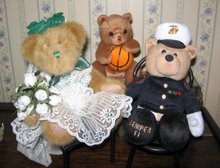skip to main |
skip to sidebar
BLUB Fear not-- Winefred has been hiding out, adrift at the bottom of the well (think Dustin Hoffman in his scuba gear at the Braddocks' pool party)-- but has not totally drownded, just gone all purply-white and wrinkled.Blogging shall re-commence shortly, with wildly random thoughts, political Fredheadings, Arrowhead rippings, movies, reading material, and grandmotherly reflections on super-baby in flannel burka.
Fear not-- Winefred has been hiding out, adrift at the bottom of the well (think Dustin Hoffman in his scuba gear at the Braddocks' pool party)-- but has not totally drownded, just gone all purply-white and wrinkled.Blogging shall re-commence shortly, with wildly random thoughts, political Fredheadings, Arrowhead rippings, movies, reading material, and grandmotherly reflections on super-baby in flannel burka.
I've been working on a post, but today
VICTOR DAVIS HANSEN says
EVERYTHING THAT NEEDS SAYING
[hat-tip Jewish World Review]
 The other D-Day
The other D-Day
Sixty-three years ago this week, we landed on the Normandy beaches. As on each anniversary of June 6, 1944, much has been written to commemorate the bravery and competence of the victorious Anglo-American forces.
All true. But as we ponder this achievement of the Greatest Generation that helped lead to the surrender of Nazi Germany less than a year later, we should remember that the entire campaign was, as Wellington said of Waterloo, a near-run thing.
Our forefathers made several mistakes. They attacked nonexistent artillery emplacements. Planes dropped paratroopers far from intended targets. Critical landing assignments on Omaha Beach were missed.
 Once they left shore, it got worse. Indeed, D-Day was soon forgotten in the nightmare of GIs being blown apart in the Normandy hedgerows by well-concealed, entrenched German panzers.
Once they left shore, it got worse. Indeed, D-Day was soon forgotten in the nightmare of GIs being blown apart in the Normandy hedgerows by well-concealed, entrenched German panzers.
Apparently, no American planners — from Army Chief of Staff Gen. George Marshall down to the staff of Allied Supreme Commander Gen. Dwight D. Eisenhower — had anticipated either the difficulty of penetrating miles of these dense thickets or the deadliness of new German model tanks and anti-tank weapons. So we landed in Europe with the weaponry we had — and it was in large part vastly inferior to that of the Wehrmacht .
The most brilliant armored commander in U.S. history, George S. Patton, had been sacked from theater command for slapping an ill soldier the prior year in Sicily. Gens. Omar N. Bradley and Bernard L. Montgomery lacked his genius and audacity — and tens of thousands of Allied soldiers were to pay for Patton's absence at Normandy.
We finally broke out of the mess, after using heavy bombers to blast holes in the German lines. But again, these operations were fraught with foul-ups.
On two successive occasions we bombed our own troops, altogether killing or wounding over 1,000 Americans, including the highest-ranking officer to die in the European Theater, Lt. Gen. Lesley J. McNair. The nature of his death was hidden from the press — as were many mistakes and casualties both leading up to and after Normandy.
When the disaster in the bocage near the Normandy beaches ended over two months after D-Day, the victorious Americans, British and Canadians had been bled white.
Altogether, the winners of the Normandy campaign suffered a quarter-million dead, wounded or missing, including almost 30,000 American fatalities — losing nearly 10 times the number of combat dead in four years of fighting in Iraq....
....While we were ground up in the hedgerows, in the Pacific theater thousands of American amphibious troops were lost during the Marianas campaign. True, we kept winning gruesome amphibious assaults, but we didn't seem to learn much from them.
 Instead, far worse carnage lay in store at places named Peleliu, Iwo Jima and Okinawa. All these bloodbaths near the end of the war were characterized by the sheer heroism of the American soldier — who suffered terribly from intelligence failures and poor leadership of his superiors.
Instead, far worse carnage lay in store at places named Peleliu, Iwo Jima and Okinawa. All these bloodbaths near the end of the war were characterized by the sheer heroism of the American soldier — who suffered terribly from intelligence failures and poor leadership of his superiors.
What can we learn, then, on this anniversary of the Normandy campaign?
By any historical measure, our forefathers committed as many strategic and tactical blunders as we have in Afghanistan and Iraq — but lost tens of thousands more Americans as a result of such errors. We worry about emboldening Iran by going into Iraq; the Normandy generation fretted about empowering a colossal Soviet Union.
Of course, World War II was an all-out fight for our very existence in a way many believe the war against terror that began on 9/11 is not. Even more would doubt that al-Qaida jihadists in Iraq pose the same threat to civilization as the Wehrmacht did in Europe.
Nevertheless, the Normandy campaign reminds us that war is by nature horrific, fraught with foolish error — and only won by the side that commits the least number of mistakes. Our grandfathers knew that. So they pressed on as best they could, convinced that they needn't be perfect, only good enough, to win.
is by nature horrific, fraught with foolish error — and only won by the side that commits the least number of mistakes. Our grandfathers knew that. So they pressed on as best they could, convinced that they needn't be perfect, only good enough, to win.
The American lesson of D-Day and its aftermath was how to overcome occasional abject stupidity while never giving up in the face of an utterly savage enemy. We need to remember that now more than ever.
Victor Davis Hanson is a classicist and military historian at the Hoover Institution, Stanford University. [his website here]
 Winefred observes: See the German POW's sitting on the ground in a row. They are not handcuffed or hooded or on their knees. They are disarmed; they wait; their guards look genial. Maybe that's their reward for never having been part of a cell that plotted car-bomb attacks on civilians, never having constructed suicide belts to be worn by their sisters or mothers, never having beheaded anyone and danced in his blood while ululating for a video camera. If they'd been concentration camp guards things would have gone harder for them, but as far as we know they were just grunts on the battlefield.
Winefred observes: See the German POW's sitting on the ground in a row. They are not handcuffed or hooded or on their knees. They are disarmed; they wait; their guards look genial. Maybe that's their reward for never having been part of a cell that plotted car-bomb attacks on civilians, never having constructed suicide belts to be worn by their sisters or mothers, never having beheaded anyone and danced in his blood while ululating for a video camera. If they'd been concentration camp guards things would have gone harder for them, but as far as we know they were just grunts on the battlefield.
There are parallels from war to war-- but there are differences too.

























